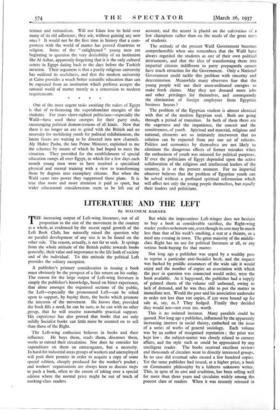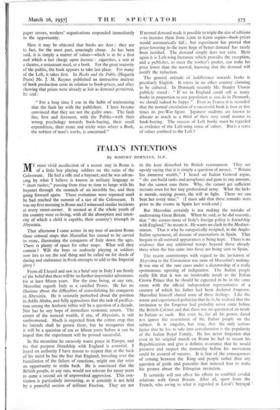LITERATURE AND THE LEFT
By MALCOLM BARNES
THE increasing output of Left-wing literature, out of all proportion to the size of the movement in the country as a whole, as evidenced by the recent rapid growth of the Left Book Club, has naturally raised the question why no parallel development of any size is to be found on the other side. The reason, actually, is not far to seek. It springs from the whole attitude of the British public towards books generally, their value and importance to the life both of society and of the individual. To this attitude the political Left provides the solitary exception.
A publisher's primary consideration in issuing a book must obviously be the prospect of a fair return on his outlay. The reason for the large output of Left-wing literature is simply the publisher's knowledge, based on bitter experience, that alone amongst the organised sections of the public, the Left—especially the pronounced Left—can be relied upon to support, by buying them, the books which promote the interests of the movement. He knows that, provided the book fills a need, he can be sure, as he can with no other group, that he will receive reasonable practical support. His experience has also proved that books that are only mildly Socialist books can little more be counted on to sell than those of the Right.
The Left-wing enthusiast believes in books and their influence. He buys them, reads them, discusses them, works to extend their circulation. Nor does he consider his expenditure on them an extravagance, but a necessity. In hard-hit industrial areas groups of workers and unemployed will pool their pennies in order to acquire a copy of some special edition, cheaply produced for the worker's pocket ; and workers' organisations are always keen to discuss steps to push a book, often to the extent of taking over a special edition where the normal price might be out of reach of working-class readers. But while the impecunious Left-winger does not hesitate to buy a book at considerable sacrifice, the Right-wing reader prefers to borrow one, even though its cost may be much less than that of his week's smoking, a seat at a theatre, or a meal any evening in town. The great majority of the middle- class Right has no use for political literature at all, or any serious book-buying for that matter.
Not long ago a publisher was urged by a wealthy peer to reprint a particular anti-Socialist bock, and the request was backed by prolific assurances of the wide sale it would enjoy and the number of copies an association with which the peer in question was connected would order, were the book available. As it happened, the publisher had a supply of printed sheets of the volume still unbound, owing to lack of demand, and he was thus able to put the matter to immediate test. Would the peer and his association undertake to order not less than too copies, if 250 were bound up for sale at, say, is. ? They hedged. Finally they decided they would not—not even ros. worth.
This is no isolated instance. Many parallels could be quoted. Not long ago a publisher, influenced by the apparently increasing interest in social theory, embarked on the issue of a series of works of general sociology. Each volume was by an author of recognised reputation ; the price was kept low ; the subject-matter was closely related to current affairs, and the style such as could be appreciated by any intelligent reader. The books received excellent reviews and thousands of circulars went to directly interested groups. In no case did eventual sales exceed a few hundred copies. Yet the same publisher had issued, at a higher price, a book on Communist philosophy by a hitherto unknown writer. This, in spite of its cost and erudition, has been selling well for more than three years and circulates widely among the poorest class of readers. When it was recently reissued in paper covers, workers' organisations responded immediately to the opportunity.
Here it may be objected that books -are dear ; they are in fact, for the most part, amazingly cheap. As has been said, it is simply a matter of values—which is to be a first and which a last charge upon income : cigarettes, a seat at a theatre, a restaurant meal, or a book. For the great majority of the public, the book appears to take last place. For many of the Left, it takes first. In Books and the Public (Hogarth Press) Mr. J. M. Keynes published an instructive analysis of book production costs in relation to book-prices, and after showing that prices were already as low as demand permitted, he said : " For a long time I was in the habit of maintaining that the fault lay with the publishers. I have become convinced that they are not the guilty ones. The fault lies, first and foremost, with the Public—with their wrong psychology towards book-buying, their small expenditure, their mean and tricky ways where a Book, the noblest of man's works, is concerned." If normal demand made it possible to triple the size of editions —to increase them from 2,000 to 6,000 copies—book-prices would automatically fall ; but experiment has proved that price-lowering in the mere hope of better demand has rarely been justified. The demand simply does not exist. Here again it is Left-wing literature which provides the exception, and a publisher, to meet the worker's pocket, can make his price lower than the normal, knowing that the demand will justify the reduction.
The general attitude of indifference towards books is peculiarly English. It exists in no other country claiming to be cultured. In Denmark recently Mr. Stanley Unwin publicly stated : " If we in England could sell as many books in proportion to our population as you do in Denmark, we should indeed be happy." Even in France it is recorded that the normal circulation of a successful book is four or five times its pre-War figure. Japanese students are known to allocate as much as a third of their very small income to book-buying. The success of Left books must be regarded as evidence of the Left-wing sense of values. But is a sense of values confined to the Left ?











































 Previous page
Previous page